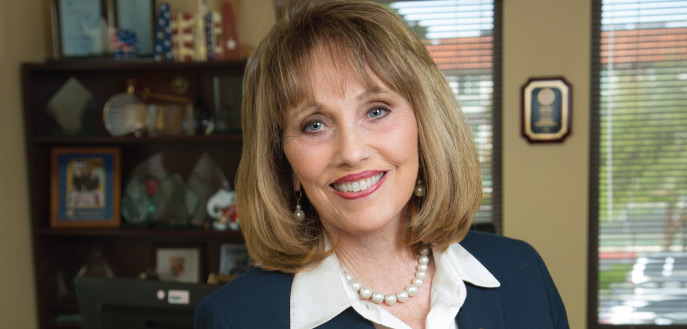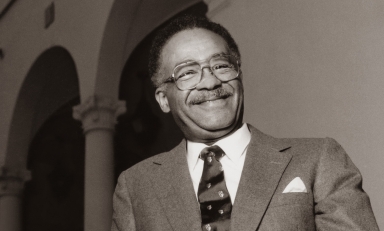
Pat Bates ’61 is only the second woman ever to lead a party caucus in the California State Senate—and she’s reaching across the aisle to bring relevance to a challenging role
Pat Bates ’61’s political genesis started three decades ago at the corner of Crown Valley and Alicia parkways, in what was then unincorporated Laguna Niguel in south Orange County. The former social worker had just moved to the community from Long Beach, and tensions were high after a child was struck and killed by a car at the intersection. Frustrated residents petitioned the county board of supervisors to make safety improvements, including installing streetlights, but to no avail.
That’s when a group of calculator-toting women, with Bates as their de facto leader, planted themselves at the intersection and counted cars. They called themselves Citizens for a Safer Crown Valley Parkway, and participants were determined to use their data to sway supervisors to add lights and build crosswalks, sidewalks, and bike lanes.
“We decided to take things into our own hands, and I became known as the traffic lady,” says Bates, who worried about the safety of her two young children riding their bikes or walking to and from school. “We were derided by some who said, ‘Oh, don’t pay attention to those housewives with calculators. They don’t know what they’re doing.’”
Not only did Bates’ actions help trigger improvements, the upheaval also paved the way for Laguna Niguel to incorporate as a city in 1989. Bates was voted the nascent city’s inaugural mayor, and she spent the next decade on the council. She was a member of the California Assembly from 1998 to 2004, and served on the Orange County Board of Supervisors from 2007 to 2014.
In 2014, Bates was elected to the California Senate from the 36th District, an affluent, mostly white Republican stronghold, beating her challenger by 31 percent. Last April, she was named the Senate minority leader, becoming just the second woman—Republican or Democrat—to lead a party caucus in the chamber’s history.
Despite all of the high-fives she’s gotten from colleagues, leading the GOP caucus can be an exercise in frustration. California Republicans have become something of an endangered breed, accounting for just 25.9 percent of the electorate (compared to 44.8 percent registered Democrats). Even Bates’ reliably red Orange County district voted for Hillary Clinton at the top of the ticket in 2016.
“There’s a high degree of concern about, are we going from Orange County red to Orange County blue, or maybe Orange County purple?” she says. “If I can’t deliver a piece of legislation, but someone else in the other party who’s got the same idea and wants to implement it in the same way, then I go with them. You see a lot of that going on, but it doesn’t get a lot of attention.”
Part of that acquiescence comes from the fact that Democrats in 2016 secured two-thirds of the seats in both houses of the Legislature. The so-called “supermajority” means Democratic lawmakers theoretically can pass taxes or enact legislation without Republican support.
“It’s an honor to have my colleagues believe that I can bring relevance to our role,” Bates says. “I certainly stand up for them when the rules of the house are abridged at times—in terms of who can speak and whether a particular piece of legislation is given an opportunity to be heard. When you’re a supermajority, you can make the other side irrelevant, and that’s where we get into some really emotional discussions.”
Bates has successfully worked with Democrats to advance legislation. Among her notable bipartisan accomplishments are AB 2139, which integrates climate change scientific data into state infrastructure engineering, and AB 2800, which reinforces opposition to new oil drilling off the California coast.
“When working across the aisle, Sen. Bates’ experience stands out, and members of both parties regard her for her insight and integrity as a public servant,” says Sen. Janet Nguyen (R-34th District), who met her colleague when both served on the Orange County Board of Supervisors. “She listens before she reacts, analyzes what is being said, and looks for opportunities to propose solutions.”
One of the latest partisan divides is over California’s new 12-cent-per-gallon gasoline tax, created to raise money to address a $130-billion repair and replacement backlog when it comes to roads, bridges, mass transit, and bike lanes.
Bates is a stalwart tax opponent who supports finding solutions to climate change and who sees homelessness and the shortage of affordable housing in the state as detriments to California’s future. In the Senate, she has authored several community safety measures, including SB 722, which would crack down on sex offenders who willfully remove or disable their global positioning system; and SB 1283, which would restrict the presence of sober living homes in neighborhoods.
Growing up in Long Beach, Bates shied away from any political ambitions. As a psychology major at Oxy, she planned to become a school guidance counselor and attended Long Beach State for a year to work on her master’s degree. But the Long Beach Unified School District required counselors to teach first. “My dad looked at me and said, ‘I think it’s time for you to get a job,’” Bates recalls. “He said, ‘If you want to do counseling, that’s great. But you need to be on your own time because we’ve got your brother and sister coming up.’ And I said, ‘I hear you, Dad.’”
Bates enrolled at Occidental on the advice of a friend who was accepted at the College after attending high school in Long Beach. “She convinced me that it was the perfect school for me because it was smaller. Again, I was this kind of shy, retiring person,” says Bates, who studied abroad at the University of Madrid during her junior year.
The experience, particularly History of Civ, “showed the progression of society and the evolution of the human spirit and the brain,” she recalls. “I acquired critical thinking skills—that was very much part of my Oxy experience. The professors helped us hone those skills, so that we had a rich understanding of society and government and how it worked. As I matured, I reflected on what I learned and how you look at a problem and find a solution.”
Her time at Occidental “was illuminating,” she adds. “It really made me ask, ‘Who am I? Why am I here? And what is going to be my legacy?’”
It was as a social worker for the Los Angeles Department of Social Services that Bates saw government’s shortcomings and developed some of the sensibilities that continue to guide her today. “I was engaged with government as a bureaucrat, and I had a jaundiced view of government programs because they were not helping people move out of poverty,” she says. “My interest in government probably was to be a reformer, if anything, and that isn’t always what you need to do when you’re a housewife and a mom.”
She was 23 and on the job when the Watts riots erupted in 1965. Bates couldn’t go into the neighborhood because of safety concerns. She took a nuanced view of the unfolding violence. “In an instant, that anger that had been suppressed for all those years erupted, and I wasn’t aware of it,” she says. “It was shocking. All of the money and efforts that have gone into trying to eradicate racism, and we’re still not there.
“You can’t deal with [a challenge] when you have an ideology and say, ‘This is what’s wrong, and that’s the only way I’ll view it,’” she adds. “We all have a stake in it, and we all, probably, are part of the problem. We have to look at ourselves more closely.”
The polarization afflicting politics is something that Bates thinks about constantly. “The question is, what happened along the way? I don’t have an answer to that.”
She learned to overcome her shyness by focusing on the bigger picture. “When you’re fighting for a cause, then you’re not focused on yourself,” she says. “I knew how to write out a speech and deliver it in three minutes— which is what you’re given at the podium in government—because I had done that in social work. I was able to detach myself from being so shy when I was fighting for something like my child’s safety, or other people’s safety.”
She’s also a role model to women in the face of roiling sexual harassment scandals at the Capitol. Bates says she has not experienced inappropriate behavior from male colleagues. “I think more and more women, young women, are getting involved in the policy arena and being inspired by people like myself,” she adds.
Jim Miller, a Dana Point restaurateur who lived in Orange County’s Fifth District when Bates was a supervisor, is among her staunchest supporters. In the aftermath of a revitalization program approved by the Board of Supervisors in 2006, Bates was able to acquire leases for 26 merchants in Dana Point Harbor. Miller owns a restaurant there, Coffee Importers, as well as Boneyard Café at Doheny State Beach.
“She’s probably one of the most professional people I’ve ever worked with,” says Miller, a Republican. “Pat fights for people, regardless of their party affiliations. She believes, wholeheartedly, that she can help her constituents.”
Adds Bates: “I represent a million people, and there are 13 members of my caucus. That’s 13 million people who are Democrat, Republican, or no political party. They all deserve representation.”
Andy Faught wrote “An Occidental Truth” in the Fall 2017 magazine. Photos by Jim Coit.



